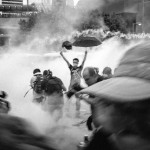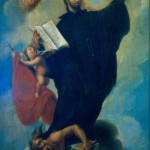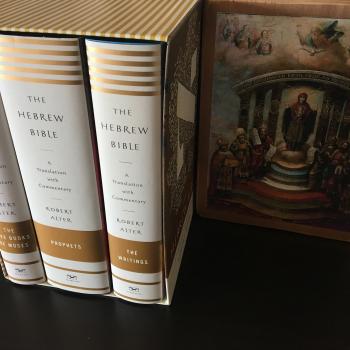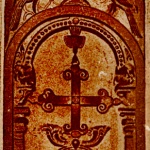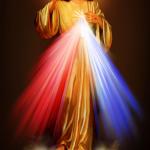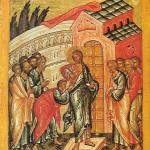![Umbrella Movement in Hong Kong - by Pasu Au Yeung (Hong_Kong_Umbrella_Revolution_) [CC BY 2.0 (https://creativecommons.org/licenses/by/2.0/deed.en)], via Wikimedia Commons](https://wp-media.patheos.com/blogs/sites/721/2014/09/Hong_Kong_Umbrella_Revolution_-UmbrellaMovement_-umbrellarevolution_-a7s_15455875715-1024x576.jpg)
With that kind of Chinese Christian history driving the solidarity we showed at the Chinese Consulate last night, you could say that we were standing on holy ground. With the 1989 protest, we sang the civil rights theme ‘We Shall Overcome.’ With the protesters in Hong Kong, we waved candles and sang their Beyond ‘海闊天空’ anthem. We had speeches that invoked the memory of Tiananmen and that said to the students that we saw them and were with them.
But Jonathan Chan, who has relatives in Hong Kong, said residents of the semi-autonomous region are not feeling the same “paranoia” they did in the early 1990s, immediately following the 1989 Tiananmen Square massacre, about brutal suppression by Beijing’s authoritarian leaders.That holy ground was trampled this morning by comments to Douglas Todd made by Company of Disciples’s founder Jonathan Chan. Just as conversations about solidarity began to light up in Vancouver, Chan told Todd:
Even though Chan generally supports the ideals of the pro-democracy movement, he said most middle-class and affluent Hong Kong residents, including his relatives, don’t really care about the protests, with many finding it annoying.
If the Hong Kong student protesters were his children, Chan said, “I’d tell them to go home and study hard for school and find a different way to make the world a better place.” Chan is executive director of Vancouver’s Company of Disciples, a Christian ministry that includes many of Metro Vancouver’s roughly 100,000 Chinese Christians.
Later on in the article, he says:
Even though Chan said there is a range of opinions among ethnic Chinese people in Canada about the escalating protests, he compared the confrontations to last year’s Quebec student demonstrations over tuition fee hikes. “Outside of Quebec’s students,” Chan said, “nobody else really cared.”
Most Chinese-Canadians don’t expect China to do anything more than move slowly toward granting additional freedoms to those under its authority, Chan said. He praised Chinese President Xi Jinping for at least rooting out corrupt officials in the government.
I will grant that the article has quotes from three sources, which also include Remy Siu, Milton Lim, and Pitman Potter. Because of this, I will grant that Douglas Todd’s interview with Siu and Lim means that there are active democratic voices in this article, ones that write theatre for a company called Hong Kong Exile no less — and who demonstrate that the ‘global support shows people in Hong Kong that the world actually cares.’ In turn, Potter obviously hasn’t been keeping up with the BBC when he says that the students have no support from the elites, but the general point that migration is not a given despite a query in the South China Morning Post about whether to leave ‘beloved Hong Kong’ is one worth noting — no migration is ever structurally automatic.
But as the director of Company of Disciples, what’s appalling is that Chan’s comments are couched as representative of ‘many of Metro Vancouver’s roughly 100,000 Chinese Christians.’ Whether or not this is his individual opinion (full disclosure: Chan and I had a semi-public conversation about this on social media), Chan’s comments implicate both Company of Disciples and every Chinese person who identified in the 2001 census that identified as ‘Catholic,’ ‘Protestant,’ and ‘Christian n.i.e.’ (full disclosure: that’s how Todd got ‘100,000 Chinese Christians’: it was 24% of a population of just under 400,000 – I know because I gave him the statistic last year when he did a profile on me). It does so because he is publicly identified as the ‘executive director of Vancouver’s Company of Disciples,’ suggesting that when he speaks, he is speaking not only for himself, but for the organization. For Todd, this organization has legitimacy to represent the 100,000 Chinese Christians because it is a ‘Christian ministry that includes many of’ them.
This is historically, geographically, and theologically problematic.
Let’s start with history. And because all knowledge is situated, let me begin personally.
For those who seldom work with journalists, the common criticism of their craft is that they pull quotes out of context to form their own agenda. Until I worked with Todd, I thought he operated similarly: his Chinese New Year piece in 2011 featured an interview with Langara College instructor Li Yu, who castigated Chinese Christian communities for being insular migrant centres without any interest in multicultural integration. I was doing research in Vancouver at the time, and this piece was consistently cited by interviewees as a piece of bad journalism in which Chinese Christians had been victimized by Douglas Todd. Todd, it was said, had used Li’s words to exclude Chinese Christian communities from public life.Imagine my fear and trembling when Todd approached me to do a profile for my research in 2013. To outside eyes, it looked like a recipe for disaster: I was in the middle of writing a dissertation on Cantonese Protestants and how they engage the public sphere, and Todd wanted to talk about the juiciest elements of that research: traditional family values politics and how it framed a Chinese Christian approach to Vancouver politics. You’ll see in the profile that it could really have been a disaster: not only did we talk about Cantonese Protestant opposition to same-sex marriage, but we related that hot-button issue to the demise of Liberal MP Raymond Chan, the rise of Conservative MP Alice Wong, and the ecclesial fractures in the Anglican Diocese of New Westminster. It was in working on that piece, however, that I gained my respect for Todd’s craft, as he delved deep into my work and sought to represent my representation of my interview subjects as complicated people with political agency.
That’s when I began to reconsider Todd’s work in light of the dissertation I was writing. Going back to the Vancouver Sun archives, I dug up everything that Douglas Todd had ever written on Chinese Christians. It turns out that it was Douglas Todd who had told the Vancouver public about the Rev. Lo Sek Wai’s activism around Tiananmen Beijing Spring solidarity in 1989. It was Douglas Todd who wrote about the emergence of Bill Chu as an activist for the organization Chinese Christians in Action (CCIA) which sprung out of the Tiananmen activism to get more Chinese Christians into public life, and it was Douglas Todd who tracked how CCIA put on Chinese New Year fairs at Oakridge Centre in the early 1990s, where Chinese Christians called on the rest of the Chinese community to change the moniker from ‘gung hei fat choy’ (恭喜發財) to ‘ping on hei lok’ (平安喜樂). That’s because something exciting was happening among Chinese Christians at the time — it was the heyday of the social service agency SUCCESS under Lilian To, the moment when SUCCESS’s previous CEO Angela Kan had been appointed to be a Citizenship and Multiculturalism Judge, the time when David Lam became Lieutenant General in British Columbia. As Todd reported, Bill Chu seized this moment to redefine Chineseness from a cultural category marked by self-interested economic success to one defined by democratic participation and solidarity with the poor. In other words, the solidarity that Chinese Christians formed around the Tiananmen Spring gave hope for a new kind of Chinese democratic sensibility in Vancouver in the early 1990s, and Douglas Todd spearheaded the reporting for that in the Vancouver Sun.
The press picked up on a new kind of Chinese political sensibility in the mid-2000s. Observing that Chinese Christians — along with other immigrant groups — had begun to swing toward the newly formed Conservative Party of Canada, Todd’s observations began to change. Gone was the public, democratic, participatory face of Chinese Christians in the early 1990s. What he noticed instead — which culminated in the 2011 Chinese New Year piece — was that they had begun to become private, insular, and uninterested in multicultural integration. Now there’s a story.
You could say that Jonathan Chan’s comments fit the new narrative of self-interested, wealthy migrants with privatized sensibilities. The trouble with that is that Chan doesn’t locate his comments in this rich history, likely because he doesn’t know it. Instead, he turns to what he does know — his own relatives’ own annoyance at the protests, discussions that reinforce Xi Jinping’s power among wealthy business people, and glib comparisons to Quebec without taking into account that the Hong Kong student protests have taken on a life of its own in recent media reporting.
This historical problem is a geographical problem. Chan’s comments exist in a historical vacuum, defined by his own small private sphere but made to represent the Chinese Christian public as a whole. But what’s more problematic is that Chan may have a ready defence of this. It’s his philosophy for how Company of Disciples views the intersection of religion and politics.
With that, we are now talking geography.
Company of Disciples is in no representative way a Chinese Christian organization. It should instead be described as a company that seeks to promote an Aristotelian approach to public life among young business people, and that Aristotelian approach is passed down through the work of Regent College theologian John Stackhouse. Much of this reading of Aristotle is based on Stackhouse’s Humble Apologetics. At the heart of Chan’s reading of Stackhouse’s reading of Aristotle is the division between pathos (the quality of the arts to evoke feelings of pity), ethos (the fundamental character of a human being), and logos (reason/logic). To this, Chan adds a distinctively Chinese element: arguing that tradition should make up the fourth side of this quadrilateral, he asserts:
I would like to add a fourth category only because of my ethnicity and the culture that I come from which is Chinese. This is called tradition which is defined as the handing down of statements, beliefs, legends, customs, information, etc., from generation to generation, especially by word of mouth or by practice, a long-established or inherited way of thinking or acting (dictionary.com.) My tradition is called Confucianism. The easiest way to explain Confucianism is like this, “Be the best that you can be in the office(s) you have been given.”
Chan argues that Stackhouse’s reading of Aristotle prescribes a balance among these four forces whenever decisions are to be made. If they get out of balance, Chan suggests, predetermined decisions can happen to cloud one’s judgment, leading to rash judgments and hasty policies. For example — and it is Chan who personifies the four forces — if logos were to make a decision on Canadian prostitution law, it would push to decriminalize so that sex could become merely a rational business transaction that generates revenue for the state, creating a win-win-win situation for providers, clients, and government. But if pathos were to decide, the human plight of sex workers might evoke in one a sense of pity for them, leading to a decision to criminalize it.
It’s in this framework that Chan’s comments to Douglas Todd need to be read. Chan is trying to balance out pathos, ethos, logos, and tradition in his reading of the Hong Kong student movement. What he finds is that much of the activism in Hong Kong is based on pathos and ethos — he is ‘generally supportive’ of the students’ right to demonstrate because it is part of their ethos (their human character), and when they were brutally attacked by the police, that summoned the pathos out of Hong Kong society to come in to protect the students. What is missing for Chan are logos and tradition. At the level of logos, the question is whether the students actually needed to use these tactics to elicit pathos from Hong Kong society — couldn’t there have been more rational, businesslike ways to deal with the situation? To bring tradition into it, don’t they know that their actions go against a Confucian tradition to be the best in the place that they’ve been given — to be students, to go home and study, to understand their place in a society that hasn’t given them democracy. If they could be fair like this, perhaps they could even understand (Chan suggests) that Xi Jinping is not all bad — he has, after all, rooted out some corruption in Chinese civil society. Finally, Chan might contend that the students have to understand that there is a limit to pathos, that outside of Hong Kong, nobody cares.
This may be cute pop philosophy. But it is not good social science, which is what Chan is framed as doing. The trouble is that this reading of the Hong Kong situation is based on Chan’s Stackhouse-Aristotelian imagination and not on the empirical grounded realities. For one, people outside of Hong Kong do care: the deluge on all of our social media feeds from a variety of formal and informal platforms is evidence enough for that. For another, the findings on the ground is that people in Hong Kong business and politics do care because they are invested in Hong Kong’s future. For thirds, the application of ‘Chinese’ cultural strands here has come in the overwhelming support of faculty for the students, which is part and parcel of what I argued yesterday was a local Hong Kong democratic tradition. If Chan’s comments reflect how his relatives and connections think — which is not to say that they completely buy the Chan-Stackhouse-Aristotle shebang — then it is their geographical reach, not the students’, that is small indeed.
What is insidious, then, is that Chan’s views are made to represent Chinese Christians when in fact he is imposing his own pop Confucianist reading of Stackhouse’s reading of Aristotle onto the situation in Hong Kong. This is not an analysis from the ground up; it is an imposition from the top down, an imposition worthy of Xi Jinping, CY Leung, and the rest of the regime(s) that make up the Hong Kong-China apparatus.
And that’s finally where we turn to theology.
In 2007, Bill Chu led a coalition that sprung up in Vancouver called Faith Communities Called to Solidarity with the Poor. Its short-term mission was to contest the City of Vancouver over whether a church needed a social services permit to provide meals and shelter to homeless people. Their work generated a document called ‘The Social Vocation of the Church,’ which argued that the central problem is that the city’s mandate meant that they stood over the poor instead of in solidarity with them and that they were trying to force the church to adopt the same posture:
The City, with its requirement of permits, management strategies and reporting mechanisms, is attempting to impose on the church conditions for operation that serve to increase social control of a segment of the population that is viewed as potentially disturbing to the well-being of property owners. So the issue is not that the church offers meals to hundreds of people each week, but that the church offers meals to hundreds of poor people each week. The City stepped in to defuse neighbourhood conflict, but did so by imposing conditions on the church that require it to maintain control and surveillance of this population. In this way, the church’s stance of solidarity with the poor– a stance that entails personal care, a deep recognition of individual dignity and worth, and the struggle for social justice– is profoundly compromised.
I always find it significant that Bill Chu led this coalition. You’ll remember that much of Douglas Todd’s early work was to track Bill Chu as he led the charge to redefine Chineseness from what he saw as a self-interested economistic culture to a democratic one in solidarity with the poor. That was because of the way that he understood the practice of evangelical theology. The Gospel, he always says, is also a call to do justice, and what that means is that one has to stand together with victims of injustice — the Tiananmen students, First Nations groups, churches fighting the city over a social services permit, Chinese Canadians written out of official history textbooks — to call for justice. There is a tradition where Christians stands alongside the poor, the marginalized, and those without political agency to demand justice. Chan is not part of it.
But the fact that Chan is not part of it does not mean that it doesn’t exist. The fact that we were out there last night at the Chinese Consulate means that the work that Bill Chu, Lo Sek Wai, and their colleagues did in 1989 and the early 1990s is not as finished as the narrative of privatization would make it out to be. To frame Chinese Canadians as so privatized out of their minds that they would find the protests annoying means that one is unaware of this strand of Chinese Christian history, geography, and theology. It means that Jonathan Chan’s Stackhouse-Aristotelian framework is a privatized bubble that has little correlation with reality, much less resources for on-the-ground solidarity with the poor. It means that Chan is necessarily uninformed — he wouldn’t have room for information outside of the world that he has constructed and imposes back onto material realities — which means that he gives no evidence that he knows about the very solidarities formed by Chinese Christians in Vancouver that made up the bulk of Douglas Todd’s early career.
The point, then, is simple: if you are uninformed, it means that you have nothing to say. The solution, of course, is simple: if you have nothing to say, don’t say anything. This is holy ground. As the writer of Ecclesiastes says, let your words be few.
For more information about how these alternative Chinesenesses that grew out of Vancouver solidarity movements with the Tiananmen Beijing Spring flourished and were ultimately contested, see my dissertation, chapters 6 and 7.

